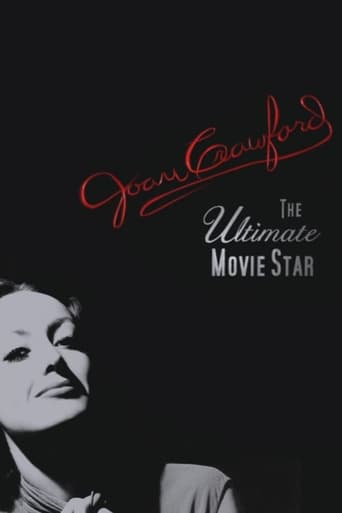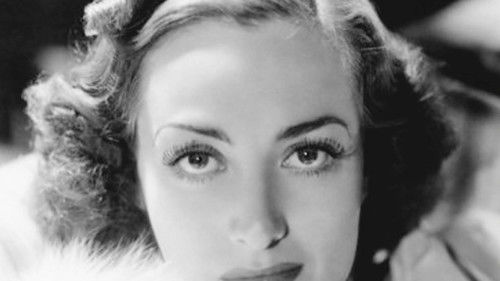Marcin Kukuczka
"I think Hollywood is the most depressing thing in the world now" (Joan Crawford)Not being well acquainted with the cinematic phenomenon of Joan Crawford and her career that highlighted the golden years of MGM, Warner Bros, and other independent studios, this documentary appears to be a lovely surprise for both her fans and people who still discover her (better late than never). Attached as a bonus to the DVD with her Oscar achievement, MILDRED PIERCE, the documentary insightfully develops her own psychology hidden behind a variety of performances. Both Crawford's biographers, including Bob Thomas, and her adopted daughter Christina Crawford provide an almost 'claustrophobic' zoom of Ms Crawford's motives, dreams, nice surprises and disappointments.Firstly, and perhaps most importantly, we get an image of a woman who experienced a journey from rags to riches. Her talent was not enough when a timid young dancer with difficult family background came to the studio as 'nobody' (with reference to Anita Page's words). Soon, however, great CRAWFORD was created, the 'ultimate Cinderella star' and her magnetic, symbolic, almost iconic 'lips' become an object of recognition along with the premiere of LETTY LYNTON (1932). Soon, she was acquainted with the 'kings' of the time like John Gilbert, Irving Thalberg, Clark Gable and had one dream that, unfortunately, never came true - a dream to play at least one single scene with the queen of MGM, Garbo. As hardly any other documentary, this one supplies us with the true wings of what 'coaching somebody's career,' the studio system and a celebrity are all about. Secondly, the documentary does justice to Joan Crawford as a personality, a deeply human personality of a 1930s' liberated American woman. What I mean here is that we do not encounter a great movie star (which could falsely be indicated by the title itself), not even her relations with people that stepped into her privacy, her marriages that were deeply influenced by the 'first love of any girl - the father' but foremost, the gratitude she had in her heart. She was grateful to all the people in the studio and, probably even more, to all her fans for what she had achieved. She knew she would have nothing, mean nothing, strive for nothing if it had not been for them. This was not the case with all movie stars but that was something characteristic of Joan Crawford. She was loyal to her fans and fans were loyal to her...What would an artist mean if he/she did not have audiences? Nothing, actually, and she understood that 'dependence.'Thirdly, her career is depicted in an interesting manner by interviewing various people who really have something to say about the movies and her personal, extraordinary contribution to the medium. In some cases of celebrity documentaries, you may get an impression that the major goal of the people interviewed is idealizing, which thankfully does not happen here. Vincent Sherman makes a constructive comment upon their mutual hobby and Joan's constant search for approval, Charles Busch observes her determination, Liz Smith recalls a touching Christmas time with the Crawfords (which highlights the star's philanthropic aims expressed also in her visits to the troops' canteen). Meanwhile, some remarks are made about the way she got on with other celebrities, including her leading man Clark Gable and her rival Bette Davis (consider the unforgettable and violent incident while shooting WHATEVER HAPPENED TO BABY JANE?). Her phobias, problems (alcoholism) and exaggerations (cleanliness) are presented tastefully and, thank goodness, without the ever present sensation. There is also a considerable time dedicated to her first movie at Warner Bros, considered by many of the film scholars as her very best achievement, THE MILDRED PIERCE for which she got an Oscar.Finally, the very last moments of the documentary reveal some truth hidden behind the make-up of a star, any star. A touching bitterness she dares express with the words I have decided to mention at the beginning of my review and moving final words of a deceasing woman who seems to lost the battle with harsh fate, who once caught the attention of the public eye as Joan Crawford, a 'perfect picture of a movie star' (as director George Cukor memorably stated).A helpful documentary as another piece of mosaic to many tributes to those who made their unforgettable contributions to cinema history! Highly recommended before you decide to see some of Joan Crawford's best movies!
MartinHafer
I love classic Hollywood films of the golden era and not surprisingly I also love biographies of that talk about these stars. Unfortunately, most of them frankly leave a lot to be desired. They usually only talk about the good points of the celebrity or only discuss their films and as a result, you get a very one-dimensional view of the person. Occasionally, you also get some that are all dirty--and once again you only get a one-dimensional portrait. I was absolutely thrilled when I watched "Joan Crawford: The Ultimate Movie Star" because it managed to do something quite rare--balance the great talent with the human being. As a result, it's one of the best celebrity biographies I've seen.Angelica Huston narrates this made for Turner Classic Movies film. It combines her nice voice with some lovely interviews, photos and film clips to talk about her life from birth to death. You get a discussion of her major films as well as her personal life--and this is where the film shines. While it does talk quite a bit about her abuse of her children and affairs (and there were many), it tried to explore WHY--what about her caused her to be so screwed up and out of place off-camera. And, it seemed less angry in doing so. So, despite many clips of Christina Crawford discussing her mom, it did not come off as a recapitulation of "Mommy, Dearest". Plus, it balanced this with genuine respect and admiration for her talents and tenacity. Together, all these factors create a rich tapestry--and make it a must-see of fans of the genre. See this one.By the way, as Bette Davis and Joan Crawford had a bit of a rivalry, I should point out that the TCM biography of Crawford was superior to the one they produced on Davis. It was longer, more complete and more interesting--warts and all.
Neil Doyle
JOAN CRAWFORD: THE ULTIMATE MOVIE STAR is far from being a glowing tribute to the film star, as most of these comments seem to suggest. It shows just how sad, how tragic her life really was behind all the glamorous facade of Hollywood phoniness.Like Bette Davis, her personal life was a mess. Both of them had bad relationships with their fathers resulting in a lifelong distrust of men, which killed any chance for happy marriage relationships. Joan went about choosing men to marry based on her own insecurities as a woman from a dubious background who wanted to learn from the men she married and cultivate herself with knowledge she otherwise would not have.We learn that her marriage to DOUGLAS FAIRBANKS, JR. was an open marriage that lasted about four years; her marriage to FRANCHOT TONE was happy as long as they stayed in the Hollywood limelight and again she was educating herself because he was a worldly, sophisticated mate, but again the marriage fell apart because of infidelities in another open marriage; she had torrid romances with most of her leading men, including director VINCENT SHERMAN, always willing to talk about his affairs with the many actresses he directed.Nor are the comments about her--not just those by Christina Crawford--on the positive side all the time. I'd say half and half. A word of praise followed by the "but she always had to be in control" kind of statement, from people who knew her, like LIZ SMITH, BETSY PALMER, CLIFF ROBERTSON, MARGARET O'BRIEN and others.Far from being a paean to her glory as "the ultimate movie star", it's really more of a "warts and all" confessional that fans of Crawford seem to be in denial about. Her life off screen was full of venom and hateful feuds with just about every co-worker, all the while giving the viewers a few chuckles about how she slapped everyone in films because--well, "because I do that in all my films".So you have to take the good with the bad, all the way through this documentary, which is essentially a tribute to Crawford's longevity as a name above the title film star. The only one who looks worse than Crawford is Bette Davis, whose cruelty during the aborted filming of HUSH...HUSH, SWEET CHARLOTTE reached new lows, even for Bette. Those two divas really hated each other.It's definitely a monument to her longevity, but can't exactly be looked at as a glowing tribute to the actress or her thespian abilities. The kindest, most perceptive comments on the real Joan seem to come from Hollywood columnist BOB THOMAS.Almost painful to watch are the clumsy dancing sequences showing how she made her start in early MGM films, just about the clunkiest exhibition of dancing ever performed on camera. She looks like a dancing windmill. It's a howl.But, hey, it's the Joan Crawford we all remember from the '40s that really counts. She left a rich legacy of film noir/soap opera stuff that became legendary: MILDRED PIERCE, HUMORESQUE, POSSESSED and some of the lesser Warner films (FLAMINGO ROAD, THE DAMNED DON'T CRY) in which she came into her own. But behind all that glory, it's really an awfully sad success story when it comes right down to it.Trivia note: I loved the perceptive comment by BETSY PALMER who admits feeling sorry for children in any marriage involving actors/actresses. "Beware. We're a different species," she says with a mischievous grin.
blanche-2
This is a highly entertaining, fascinating, outrageous, and sad documentary about Joan Crawford. Say what you want about her, Crawford was an amazing woman who came from nothing and with loads of ambition pushed her way to the top. Twice after her career sank to the bottom, she was able to rebuild it. Vincent Sherman, her daughter Christina, Cliff Robertson, Betsy Palmer, Liz Smith and others held nothing back when talking about the star: the multiple affairs she had with directors, her treatment of her children and husbands, and the antics that went on during the filming of Baby Jane, which were mind-boggling. Also touched on were her alcoholism, which caused her problems in later life, and her miserable childhood, which was the cornerstone of all of her problems.Crawford's only self-identification seems to have been that of a film star, and her self worth was tied to it as well. She was smart, hard-working, glamorous, and, with the exception of her daughter, those who knew her and appeared in this documentary admitted there was something likable and even vulnerable about her. Ultimately, though, her life played out like a bad B movie. You could see the end coming from a mile away.




